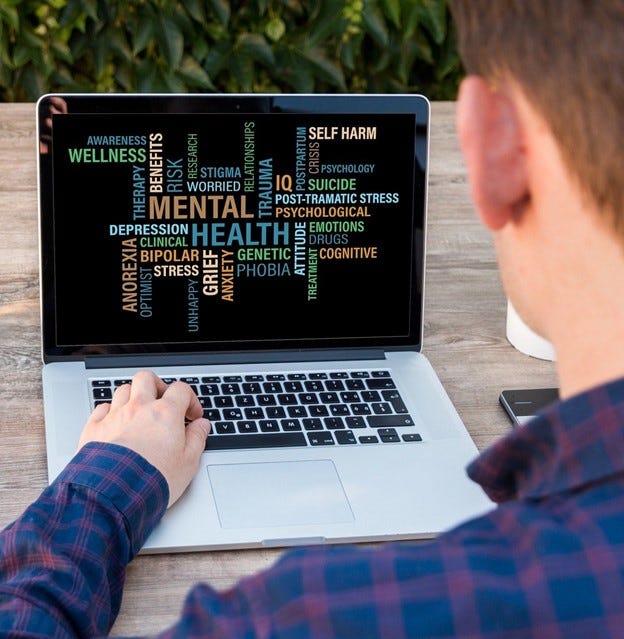Be More Than Your Mental Illness
Don't let a single aspect of your life define who you are

I worked for 22 years as a physician psychotherapist at a major university. I treated patients dealing with everything from school stress to schizophrenia. Living with Bipolar II, I was both a consumer and a provider of mental health care.
School is harder with mental illness
Getting through university is tough at the best of times. The addition of a disability whether physical, mental, or emotional, makes it that much harder. Today there are protections and accommodations for students to help with the extra difficulties presented by these challenges.
Even with all the supports available, it’s very clear that some students with mental illness do better than others. The same is true in all areas and at all stages of life, not just in school.
Everyone’s illness is unique to them in just how ill they are at any given moment. We also have different symptoms and different life situations. Even taking our differences into account one factor stands out that makes a huge difference to moving forward in the best way possible.
Strong identification with illness
What does identification with illness mean? We all identify ourselves (self-identity) based on the things that take up the most real estate in our lives. This contributes to or becomes our concept of self.
We identify with our jobs-- I’m a doctor, with our relationships-- I’m a mother, with our hobbies-- I’m a runner. We identify with whatever feels important in our lives, including illness. And therein lies the problem.
Language matters
How do you talk about whatever illness you live with? Do you say, “I am bipolar?” Do you say you are schizophrenic or depressed? Think about that.
When you say, “I am,” you are stating that the word that follows defines you. You are making an identity out of it. You’re limiting yourself without realizing it.
To say I am my illness is to say it is the most important aspect of my life. It gives the illness center stage. It puts the illness firmly in the driver’s seat
You are not your illness
We can argue about what a person actually is. We can argue from religious, scientific, or philosophical viewpoints. Regardless of what approach you take in the debate or what conclusions you come to, one thing is clear. You can’t be defined by any one aspect of your life.
You are not your illness, any more than you are your weight or hair color, or height. You aren’t your profession or your relationships.
Humans are more than any one thing. We are also more than the sum of our parts. However, we live in a world in which identity is important.
We are required to self-identify
In every aspect of our lives we’re expected to make statements of “what we are.” humans like to sort others into categories. It’s how our minds work. The mind likes shortcuts and categorization provides shortcuts.
The mind doesn’t always make the best choices in this regard. It ignores important facts. It makes mistakes. Its categorizations are often negative or otherwise harmful. I could go into dozens of areas in which this becomes dysfunctional, but this post is about mental illness.
Don’t identify as your illness
When you identify as your illness you limit yourself. You don’t ask yourself if you can accomplish something. You ask if the illness can. This ignores everything else about you that makes you unique and capable.
Among the students I treated through the years, those who fared best were those who learned not to identify strongly with their illness. This doesn’t mean they minimized it or ignored it. Doing so was a sure-fire way to derail their school careers
These students learned to put their illness in its place. They saw it as one aspect of their lives, not who they were. They did not allow their illness to define them. They didn’t let it defeat them before they started.
Learn to manage your illness
Those of us who live with mental illness understand that it is an ongoing part of our lives. We can’t shed it like clothing at the end of the day. But we don’t have to wear it so tightly that it strangles us either.
There will be times when we have to step back from the demands of life for a bit. Sometimes we have to regroup. Sometimes the illness does need to be our focus. This is true for any chronic illness, mental or physical. But we need to understand that we are managing an illness. We are not the illness.
We must not let ourselves become the illness. We must not let it define us. We must not be self-defeating.
We may not be able to do everything our peers can, or we may have to do so on a different timetable. We, like those with physical or learning disabilities, may need accommodations to achieve our full potential.
Let’s not be our own limiting factors. Let’s not identify as our illness.
Change the language
Instead of saying, “I am my illness,” say, “I have…”. Better yet, say, “I live with,” whatever illness is a part of your life.
Empower yourself to be more than your illness. Find another way to identify yourself. I am a writer, editor, and life coach who lives with Bipolar II. How about you?



Damn, you are talking about me and many I know. And you are right, we are more than our illness. We are also survivors. Living ones.
Thank you for this, Dascha. Well said! You are so correct that we are more than our illness(es). I live with several illnesses and a paradigm shift from "I am" to "I have" or "I live with" makes a huge difference. Thank you.